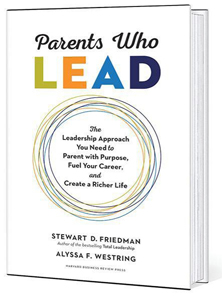Helping Working Parents Face Their Leadership Challenge
By Stew Friedman and Alyssa Westring

In our research, we demonstrated that parents can develop their leadership capacities by looking for and pursuing “four-way wins” — improving performance at work, home, in the community, and for themselves (mind, body, and spirit). This reframes the idea of “work/life balance,” which implies sacrifice in one part for success in another, and helps working parents find opportunities for gains in all parts of life.
Through dialogue with children, colleagues, and others who matter, parents can see the world through the eyes of their own stakeholders and activate the leadership skills for building trust. Essentially, by consciously and deliberately experimenting with new ways to live and work, based on a fresh perspective that accounts for the needs of people in all parts of their lives, working parents learn what it takes to lead.
 Our research has shown that when working parents begin to think and act like leaders, they uncover customized and innovative ways to collaborate with their families to make things better for everyone. Every family is different, of course, but there are some types of experiments we see repeatedly, from generating quality time by consciously creating boundaries around the use of technology, to strengthening networks by doing new things that bring people together, to practicing shared values by taking walks as a family while picking up trash, to talking with work colleagues about the challenges of raising a child with special needs. These are just a few of the many ways parenting partnerships take innovation action to intentionally align their actions with their shared values.
Our research has shown that when working parents begin to think and act like leaders, they uncover customized and innovative ways to collaborate with their families to make things better for everyone. Every family is different, of course, but there are some types of experiments we see repeatedly, from generating quality time by consciously creating boundaries around the use of technology, to strengthening networks by doing new things that bring people together, to practicing shared values by taking walks as a family while picking up trash, to talking with work colleagues about the challenges of raising a child with special needs. These are just a few of the many ways parenting partnerships take innovation action to intentionally align their actions with their shared values.
Evidence from working parents who developed their leadership mindset and skills shows that they significantly increased their satisfaction with their careers by 17 percent, with their family lives by 31 percent, with their community engagement by 39 percent, and with their personal well-being by 54 percent. And they reported a 23 percent improvement in their physical and mental health as well as a 31 percent reduction in stress.
Leaders in the life sciences, at all levels, should strive to overcome the hurdles that stand in the way of more beneficent policies and practices to enable the mothers and fathers in their organizations to perform well in all the roles that matter to them. At the same time, it’s possible to take steps like the ones we’ve described here to empower working parents to gain a greater sense of purpose, control, and harmony — to lead the lives they truly want.
STEW FRIEDMAN, PH.D., an organizational psychologist at Wharton, founded Wharton’s Leadership Program and its Work/Life Integration Project. He also is a bestselling author, renowned speaker, and radio host.
ALYSSA WESTRING, PH.D., is associate professor of management at the Driehaus College of Business, DePaul University. Westring is co-author of the book, Parents Who Lead (March 2020), and director of research, total leadership.
